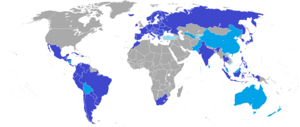Fédération Cynologique Internationale facts for kids
 |
|
| Abbreviation | FCI |
|---|---|
| Formation | May 22, 1911 |
| Type | Federation of kennel clubs |
| Legal status | Active |
| Location | |
|
Region served
|
International |
|
Official language
|
French, English, German, Spanish |
|
President
|
Tamas Jakkel |
|
Main organ
|
FCI General Committee |
The Fédération Cynologique Internationale (FCI), also known as the International Canine Federation, is the biggest group of national kennel clubs and purebred dog registries in the world. It is located in Thuin, Belgium. The FCI works with 98 member countries and partners, with one group from each country.
Contents
What is the FCI?
The FCI is like a big international club for dog lovers and breeders. It makes sure that dog pedigrees (family trees) and dog show judges are recognized by all its member countries. This means if a dog has a pedigree from one FCI country, it's accepted in another. Unlike local kennel clubs, the FCI itself doesn't give out pedigrees for individual dogs. That job belongs to the national dog organizations that are part of the FCI.
How the FCI Helps Dog Breeds
The FCI officially recognizes 356 different dog breeds. Each breed is seen as belonging to a specific country. This is usually the country where the breed first started. These "owner" countries write the breed standard for their dogs. A breed standard is a detailed description of what the perfect dog of that breed should look like.
The FCI helps publish and keep these breed standards updated. They also translate them into four main languages: English, French, German, and Spanish. These standards are super important for judges at dog shows in FCI countries. They use them to decide which dogs are the best examples of their breed. Dog breeders also use these standards to help them breed top-quality dogs.
FCI's Global Reach
The FCI is known as the largest kennel club in the world. It has members in Europe, Africa, the Americas, Asia, and Oceania. Most countries around the globe are part of the FCI. However, some countries like the United Kingdom, the USA, and Canada have their own large kennel clubs that are not direct members. Even so, the FCI often has special agreements with these clubs. For example, they agree to recognize each other's pedigrees and judges.
History of the FCI
The FCI was first started in 1911. It was created by kennel clubs from Austria, Belgium, France, Germany, and the Netherlands. Their main goal was to make dog breeding, showing, and judging the same all over the world.
The FCI stopped working during World War I. But it was brought back to life in 1921 by Belgium and France. Since then, more and more countries have joined. Today, it includes kennel clubs from most countries worldwide.
Dog Health and Welfare
The FCI cares a lot about the health and well-being of dogs. They have taken strong steps on some important issues. For example, the FCI has moved towards banning practices like ear cropping and tail docking. These are procedures where a dog's ears or tail are surgically altered. They also forbid dogs with cropped ears or docked tails from being shown in dog shows in FCI member countries.
The FCI also focuses on improving dog health. This is especially true for breeds that might have health problems. This can happen if a breed has a very small gene pool. They also pay attention to issues like breathing problems in dogs with flat faces, known as brachycephalic obstructive airway syndrome.
Dog Breed Groups
The FCI recognizes many different dog breeds. It divides them into ten main groups. These groups are based on things like how the dogs look or what job they were bred to do.
- Sheepdogs and cattle dogs (but not Swiss cattle dogs)
- Pinschers and schnauzers, molossoid breeds, Swiss mountain and cattle dogs, and other breeds
- Terriers
- Dachshunds
- Spitz and primitive types
- Scenthounds and related breeds
- Pointers and setters
- Retrievers, flushing dogs, and water dogs
- Companion and toy dogs
- Sighthounds
FCI Members and Partners
The FCI has members, associates, and partners in 98 countries. This includes many countries from all over the world.
Some of the FCI's partners include:
| Country | FCI partner | Agreement |
|---|---|---|
| Canada | Canadian Kennel Club (CKC) | 1 April 2009 |
| United Kingdom | The Kennel Club (KC) | 1 May 2017 |
| United States | American Kennel Club (AKC) | 5 November 2005 |
See also
 In Spanish: Federación Cinológica Internacional para niños
In Spanish: Federación Cinológica Internacional para niños
- Dogs portal
 | Lonnie Johnson |
 | Granville Woods |
 | Lewis Howard Latimer |
 | James West |


